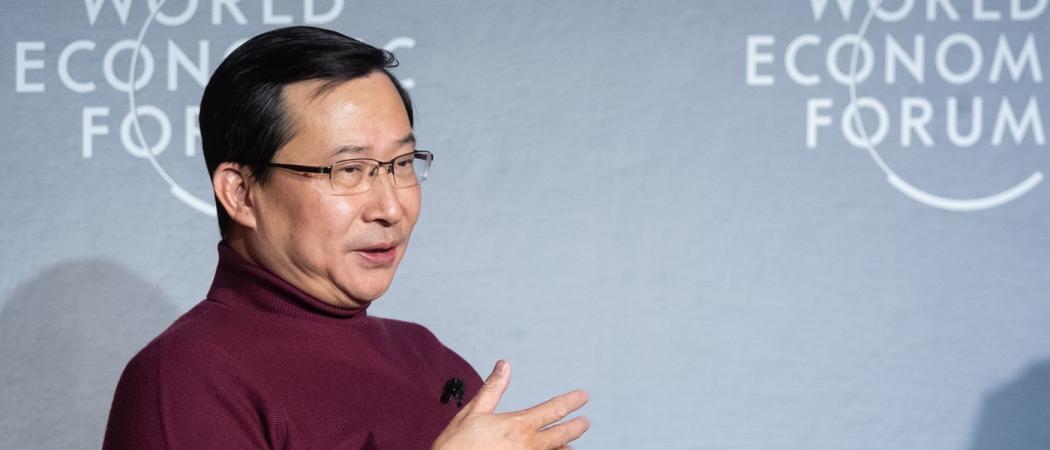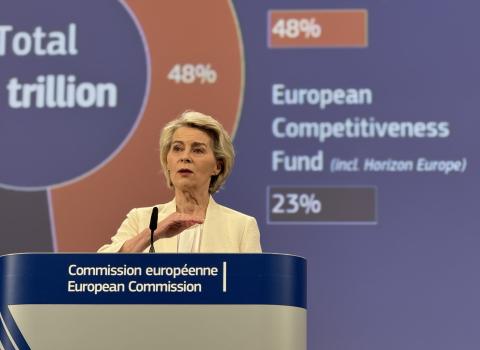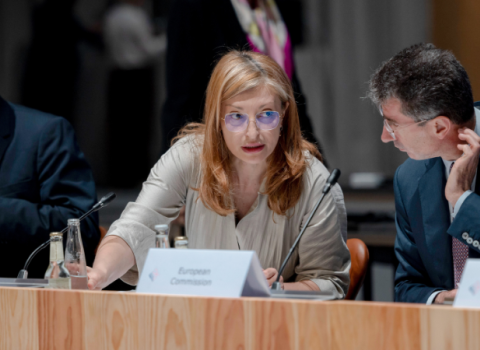President of Capital Medical University in Beijing, Rao Yi, says US president Donald Trump is ‘disrupting exchanges that would benefit humankind’

Rao Yi, president of Capital Medical University in Beijing. Photo: World Economic Forum/Mattias Nutt.
The head of Beijing’s Capital Medical University has taken direct aim at Donald Trump, accusing the US President of “persecuting Chinese scientists” and damaging global science collaboration.
Speaking at the annual World Economic Forum in Davos on Wednesday, Rao Yi called Trump a “unique and strange liar” who is hurting science “exchanges that would benefit human kind”.
In an angry address, Rao broadened his attack to include the director of the National Institutes of Health (NIH), Francis Collins. Rao alleged that along with Trump, Collins is, “institut[ing] policies specifically targeting scientists of Chinese origin in biomedical science.”
Rao’s outpouring of criticism exposes the deep tension and mistrust at the heart of a long-running dispute between the world’s two largest economies.
Alongside an unrelenting trade war, the last year has seen an escalation in efforts to identify scientists who, it is claimed, are stealing intellectual property and technologies from US research centres.
US officials are investigating hundreds of cases involving the potential theft of research secrets by scientists, nearly all of them of Chinese descent, including naturalised American citizens.
In 2018 Collins sent a letter to the more than 18,000 institutions backed by NIH funds, stating that he was concerned that “some foreign entities” were interfering in NIH-backed projects. The missive urged vigilance and for facilities to investigate any undeclared foreign ties.
The massive crackdown has led to multiple arrests, resignations and contract terminations. Most of the scientists under investigation have not been named. One reported arrest was of a Chinese doctoral student working in the Beth Israel Hospital in Boston, who allegedly tried to smuggle biological material back to Beijing in his sock.
Rao said the pressure on Chinese scientists was for “no good reason” and amounted to “political intimidation”.
“It’s not the military; there are no secrets to steal,” Rao said. “I have friends [of Chinese descent] who are American citizens and [last year] armed personnel came to them in airports and confiscated their computers.”
Arrests of scientists thought to be in possession of state secrets are not new and pre-date Trump coming to power. In 2013, for example, there were reports of the FBI arresting a NASA-affiliated Chinese researcher named Bo Jiang. The scientist, who in the end pleaded guilty to a single count of misusing government office equipment, was released and ordered to leave the US.
Rao, a leading neuroscientist, has himself been caught up in these frictions. He spent 22 years studying and working in the US, acquiring American citizenship, before returning to China in 2007. Rao is reported to have handed back his U.S. citizenship subsequently. He has since been refused visas to enter the US for scientific meetings.
Rao’s outburst came as part of a discussion on global science cooperation, when he was speaking alongside another world leading biomedical scientist who has spent most of his professional life in the US, the European Research Council’s (ERC) new president, Mauro Ferrari.
Ferrari, who took over the ERC reins from Jean-Pierre Bourguignon at the beginning of January, didn’t comment directly on Rao’s comments, but mentioned his “many great relationships with Chinese scientists” in the US.
As the father of nanobiology, Ferrari was previously at the MD Anderson Cancer Centre and the University of Texas Health Science Center in Houston, where he chaired the department of nanomedicine and biomedical engineering.
After stepping into the post of head of ERC, Ferrari is retaining two US affiliations, at the University of Washington and as a main board director of the biotech company Arrowhead Pharmaceuticals.
Another panellist, Stefan Oschmann, chair and CEO of the German chemical and pharmaceutical company, Merck Group, said science, for the most part, has been able to transcend politics. “We have Israelis working alongside Iranians,” in one of our labs, he said. But he did point out that certain scientific disciplines, such as semiconductor design and artificial intelligence, are now taking on geostrategic importance. It isn’t just the US, but other “big, big countries” too, that felt this, Oschmann said.
Rao accused US scientists of not standing up for their colleagues generally, saying that climate science was another discipline “being crushed” under Trump.
“American scientists are failing the test of political pressure. Every scientist should stand up for their principles,” he said.
A founding director of the Chinese Institute for Brain Research, Rao said he been denied visas for science trips to the US, but has travelled freely to countries including Canada, the UK, Germany and Switzerland.
The US approach is casting a chill over science collaborations. “At global level in science, there’s no nationalism. There’s only Trumpism in the US, which is damaging international collaboration,” he said.





 A unique international forum for public research organisations and companies to connect their external engagement with strategic interests around their R&D system.
A unique international forum for public research organisations and companies to connect their external engagement with strategic interests around their R&D system.